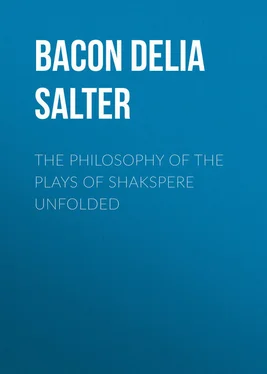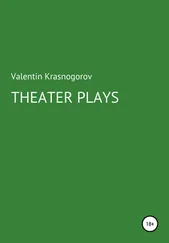Delia Bacon - The Philosophy of the Plays of Shakspere Unfolded
Здесь есть возможность читать онлайн «Delia Bacon - The Philosophy of the Plays of Shakspere Unfolded» — ознакомительный отрывок электронной книги совершенно бесплатно, а после прочтения отрывка купить полную версию. В некоторых случаях можно слушать аудио, скачать через торрент в формате fb2 и присутствует краткое содержание. Жанр: literature_19, foreign_antique, foreign_prose, на английском языке. Описание произведения, (предисловие) а так же отзывы посетителей доступны на портале библиотеки ЛибКат.
- Название:The Philosophy of the Plays of Shakspere Unfolded
- Автор:
- Жанр:
- Год:неизвестен
- ISBN:нет данных
- Рейтинг книги:3 / 5. Голосов: 1
-
Избранное:Добавить в избранное
- Отзывы:
-
Ваша оценка:
- 60
- 1
- 2
- 3
- 4
- 5
The Philosophy of the Plays of Shakspere Unfolded: краткое содержание, описание и аннотация
Предлагаем к чтению аннотацию, описание, краткое содержание или предисловие (зависит от того, что написал сам автор книги «The Philosophy of the Plays of Shakspere Unfolded»). Если вы не нашли необходимую информацию о книге — напишите в комментариях, мы постараемся отыскать её.
The Philosophy of the Plays of Shakspere Unfolded — читать онлайн ознакомительный отрывок
Ниже представлен текст книги, разбитый по страницам. Система сохранения места последней прочитанной страницы, позволяет с удобством читать онлайн бесплатно книгу «The Philosophy of the Plays of Shakspere Unfolded», без необходимости каждый раз заново искать на чём Вы остановились. Поставьте закладку, и сможете в любой момент перейти на страницу, на которой закончили чтение.
Интервал:
Закладка:
'But for her father sitting still on hie,
Did warily still watch the way she went,
And eke from far observed with jealous eye,
Which way his course the wanton Bregog bent.
Him to deceive, for all his watchful ward,
The wily lover did devise this slight.
First, into many parts, his stream he shared,
That whilst the one was watch'd, the other might
Pass unespide, to meet her by the way.
And then besides, those little streams, so broken,
He under ground so closely did convey,
That of their passage doth appear no token.'
It was the author of the 'Faery Queene,' indeed, his fine, elaborate, fertile genius burthened with its rich treasure, and stimulated to new activity by his poetical alliance with Raleigh, whose splendid invention first made apparent the latent facilities which certain departments of popular literature then offered, for a new and hitherto unparalleled application of this principle. In that prose description of his great Poem which he addresses to Raleigh, the distinct avowal of a double intention in it, the distinction between a particular and general one, the emphasis with which the elements of the ideal name, are discriminated and blended, furnish to the careful reader already some superficial hints, as to the capabilities of such a plan to one at all predisposed to avail himself of them. And, indeed, this Poet's manifest philosophical and historical tendencies, and his avowed view of the comprehension of the Poet's business would have seemed beforehand to require some elbow-room, – some chance for poetic curves and sweeps, – some space for the line of beauty to take its course in, which the sharp angularities, the crooked lines, the blunt bringing up everywhere, of the new philosophic tendency to history would scarcely admit of. There was no breathing space for him, unless he could contrive to fix his poetic platform so high, as to be able to override these restrictions without hindrance.
'For the Poet thrusteth into the midst, even where it most concerneth him, and then recoursing to the things fore-past, and divining of things to come , he maketh a pleasing analysis of ALL.'
And it so happened that his Prince Arthur had dreamed the poet's dream, the hero's dream, the philosopher's dream, the dream that was dreamed of old under the Olive shades, the dream that all our Poets and inspired anticipators of man's perfection and felicity have always been dreaming; but this one ' awakening ,' determined that it should be a dream no longer. It was the hour in which the genius of antiquity was reviving; it was the hour in which the poetic inspiration of all the ages was reviving, and arming itself with the knowledge of 'things not dreamt of' by old reformers – that knowledge of nature which is power , which is the true magic . For this new Poet had seen in a vision that same 'excellent beauty' which 'the divine' ones saw of old, and 'the New Atlantis,' the celestial vision of her kingdom; and being also 'ravished with that excellence, and awakening , he determined to seek her out . And so being by Merlin armed , and by Timon thoroughly instructed , he went forth to seek her in Fairy Land .' There was a little band of heroes in that age, a little band of philosophers and poets, secretly bent on that same adventure, sworn to the service of that same Gloriana, though they were fain to wear then the scarf and the device of another Queen on their armour. It is to the prince of this little band – 'the prince and mirror of all chivalry' – that this Poet dedicates his poem. But it is Raleigh's device which he adopts in the names he uses, and it is Raleigh who thus shares with Sydney the honour of his dedication.
'In that Faery Queene, I mean,' he says, in his prose description of the Poem addressed to Raleigh, 'in that Faery Queene, I mean Glory in my general intention; but, in my particular, I conceive the most glorious person of our sovereign the Queen, and her kingdom – in Fairy Land .
'And yet, in some places, I do otherwise shadow her. For considering she beareth two persons, one of a most Royal Queen or Empress , the other of a most VIRTUOUS and BEAUTIFUL lady – the latter part I do express in BEL-PHEBE, fashioning her name according to your own most excellent conceit of " Cynthia ," Phebe and Cynthia being both names of Diana .' And thus he sings his poetic dedication: —
'To thee, that art the Summer's Nightingale,
Thy sovereign goddess's most dear delight,
Why do I send this rustic madrigal,
That may thy tuneful ear unseason quite?
Thou, only fit this argument to write ,
In whose high thoughts pleasure hath built her bower ,
And dainty love learn'd sweetly to indite.
My rhymes, I know, unsavoury are and soure
To taste the streams, which like a golden showre ,
Flow from thy fruitful head of thy love's praise.
Fitter, perhaps, to thunder martial stowre ,[Footnote]
When thee so list thy tuneful thoughts to raise,
Yet till that thou thy poem wilt make known ,
Let thy fair Cynthia's praises be thus rudely shown.'
[Footnote: 'Shine forth, thou Star of Poets, and with rage Or influence chide , or cheer the drooping stage.'
BEN JONSON.]'Of me,' says Raleigh, in a response to this obscure partner of his works and arts, – a response not less mysterious, till we have found the solution of it, for it is an enigma.
'Of me no lines are loved, no letters are of price,
Of all that speak the English tongue, but those of thy device .'
[It was a ' device ' that symbolised all . It was a circle containing the alphabet, or the A B C , and the esoteric meaning of it was ' all in each ,' or all in all , the new doctrine of the unity of science (the ' Ideas ' of the New ' Academe '). That was the token-name under which a great Book of this Academy was issued.]
It is to Sidney, Raleigh, and the Poet of the 'Faery-Queene,' and the rest of that courtly company of Poets, that the contemporary author in the Art of Poetry alludes, with a special commendation of Raleigh's vein, as the 'most lofty, insolent, and passionate,' when he says,' they have writ excellently well, if their doings could be found out and made public with the rest.'
CHAPTER IV
Oliver . Where will the old Duke live?
Charles . They say he is already in the forest of Arden , and a many merry men with him; and there they live like the old Robin Hood of England: they say many young gentlemen flock to him every day, and fleet the time carelessly as they did in the golden world.
As You Like It.
Stephano [sings]. Flout 'em and skout'em; and skout'em and flout 'em, Thought is free.
Cal . That's not the tune.
[Ariel plays the tune on a tabor and pipe .]
Ste . What is this same?
Trin . This is the tune of our catch, played by – the picture of — Nobody .
But all was not over with him in the old England yet – the present had still its chief tasks for him.
The man who had 'achieved' his greatness, the chief who had made his way through such angry hosts of rivals, and through such formidable social barriers, from his little seat in the Devonshire corner to a place in the state, so commanding, that even the jester, who was the 'Mr. Punch' of that day, conceived it to be within the limits of his prerogative to call attention to it, and that too in 'the presence' itself [See 'the knave' commands 'the queen.' — Tarleton ] – a place of command so acknowledged, that even the poet could call him in the ear of England 'her most dear delight' – such a one was not going to give up so easily the game he had been playing here so long. He was not to be foiled with this great flaw in his fortunes even here; and though all his work appeared for the time to be undone, and though the eye that he had fastened on him was 'the eye' that had in it 'twenty thousand deaths.'
Читать дальшеИнтервал:
Закладка:
Похожие книги на «The Philosophy of the Plays of Shakspere Unfolded»
Представляем Вашему вниманию похожие книги на «The Philosophy of the Plays of Shakspere Unfolded» списком для выбора. Мы отобрали схожую по названию и смыслу литературу в надежде предоставить читателям больше вариантов отыскать новые, интересные, ещё непрочитанные произведения.
Обсуждение, отзывы о книге «The Philosophy of the Plays of Shakspere Unfolded» и просто собственные мнения читателей. Оставьте ваши комментарии, напишите, что Вы думаете о произведении, его смысле или главных героях. Укажите что конкретно понравилось, а что нет, и почему Вы так считаете.












